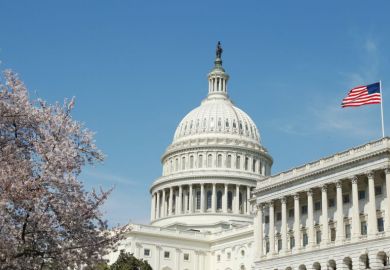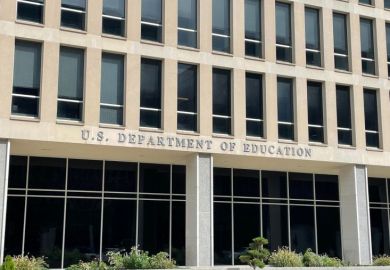A second Donald Trump administration in the US is expected to make a new push to close the federal Department of Education as a showcase for its more determined underlying goals of slashing student aid and setting academia’s educational and political limits.
The shutdown idea is the theatrical centrepiece for education issues in Project 2025, the policy playbook crafted by Trump allies inside the right-wing Heritage Foundation as an outline for their potential return to power in November’s election.
Implementation, according to Heritage, would ultimately mean ending many of the department’s higher education-related functions, including student aid, while moving others to more adversarial environs, such as student lending to the private sector, institutional accreditation to the states and employment-related activities – the preferred perspective for higher education under conservative control – to the Department of Labor.
Strategists on various sides of that debate acknowledge the political difficulty of closing the Department of Education, which gained its stand-alone status within the presidential cabinet in 1979 and has defied persistent attempts since then to remove it.
But the overall impetus goes beyond matters of departmental structure, said Jonathan Butcher, a senior research fellow in education policy at Heritage, to encompass the solidifying conservative philosophy that the federal government has become too involved in education at all levels.
“The objection is that it is not in the Constitution to have the federal government managing K12 [schools] or higher education in the United States, period,” Mr Butcher said.
Mr Butcher and Heritage have made it clear that they do not speak on behalf of the Trump campaign, though Mr Trump has backed many of its key positions – including the elimination of the Department of Education – and his campaign officials have suggested a strong alignment with the Project 2025 document.
With regard to the longstanding Republican calls to eliminate the Department of Education, Mr Butcher put a heavy justification on the botched overhaul of Fafsa – the government’s system for students to apply for aid – which did not work properly for several critical months in this year’s application cycle after the department tried to simplify its online interface.
Yet Mr Butcher also said that the strategy for the Trump administration compiled by Heritage would ultimately involve ending federal aid to low-income students, largely leaving them to rely on the generosity of any colleges and universities that could afford to subsidise them. The idea of fixing Fafsa first, despite wanting to kill its purpose, he said, stemmed from a belief that it would be too disruptive to end federal student aid immediately.
“It’s not going to happen overnight,” Mr Butcher said, referencing the expected end of federal student aid. “It will take a period of time to phase out these programmes – it would be unfair to lock the door and walk away in three months or even six months.”
Outside experts said they regarded the Department of Education as relatively safe, given that the two major parties have been close in size in Congress for years and are likely to remain that way.
“It would take an act of Congress to eliminate it,” said Rebecca Natow, an assistant professor of educational leadership and policy at Hofstra University, “and I think that plan would face opposition from Democrats and many in the higher education community who have developed relationships with and deep knowledge of the Department of Education over the years.”
But the underlying elements suggested in the Heritage plan still represented real threats to students and institutions, experts said, especially since members of a second Trump administration would arrive with considerably more ability to translate its preferences into action.
“A second Trump administration would bring a lot more experience than the first one, which would allow them to implement changes more effectively,” said Robert Kelchen, a professor of educational leadership and policy studies at the University of Tennessee-Knoxville.
Yet a potentially major limiting factor on a second Trump administration, ironically, would be the first Trump administration’s own success in appointing a US Supreme Court majority that just overturned a principle known as the Chevron deference. That legal understanding had been letting each new presidential administration rewrite the technical details for implementing laws passed by Congress – sometimes with major differences from those its predecessor had decided.
“Even though administrative actions may be eventually struck down by courts,” as a result of the new Supreme Court ruling on Chevron, Professor Kelchen said, “I expect a future Trump administration to try to test the boundaries of their power.” Examples, he said, could include trying to cut federal funding to institutions that permitted student protests, or ending the enforcement of regulations the administration didn’t like.
“Shutting down the Department of Education requires Congress, but trying to change its direction does not,” Professor Kelchen said.
POSTSCRIPT:
Print headline: Could US education department be shut?
Register to continue
Why register?
- Registration is free and only takes a moment
- Once registered, you can read 3 articles a month
- Sign up for our newsletter
Subscribe
Or subscribe for unlimited access to:
- Unlimited access to news, views, insights & reviews
- Digital editions
- Digital access to THE’s university and college rankings analysis
Already registered or a current subscriber?







